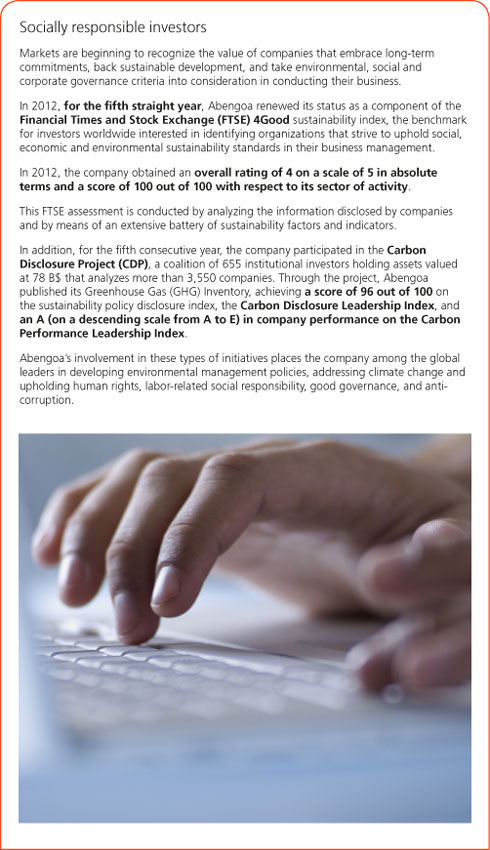 Abengoa
Abengoa
Annual Report 2012
- Corporate Social Responsibility
- People
- Shareholders
- Crecimiento continuo a través de la tecnología
Numerous opportunities for driving company growth have been identified through the corporate strategic plan, and these opportunities will enable the organization to continue to generate value for all of its shareholders. However, building upon these opportunities requires the greatest possible degree of financial flexibility, with the right capital structure in place and a presence in major world capital markets in order for Abengoa to seize and harness the potential of its strategic plan.
Abengoa has developed a business model that is based on a growth-centered strategy. Under this model, technology constitutes the first step to creating value along the range of business lines and represents the primary tool for achieving ongoing enhancement of engineering capabilities and continued development and leadership in the markets in which the company operates.
As a product of this model, the company is able to offer a wide-ranging catalog of products and services to the energy and environment sectors, and has developed the capacity to execute turnkey projects under a concession-type regime and provide operation and maintenance services, adding value and diversifying the business model.
Abengoa is also stepping up efforts to expand its international presence in order to keep growing in new markets, where the company may continue to implement an integrated business model and identify new opportunities.
In 2000, Abengoa initiated a transformation process characterized by diversification through investment in concession-type assets in order to obtain higher cash-flow recurrence, driving growth and geographical expansion. The ultimate aim of this process is to make Abengoa a much more global company with more recurrent revenues, fewer investment requirements and a mature portfolio of assets that will generate major rotation opportunities.
Financial flexibility and long-term commitment
Continuing with the successful implementation of company strategy, two key objectives were fulfilled in 2012.
In an extremely complex environment, financial flexibility in accessing the equities and fixed income markets is essential. This can be achieved through balance sheet optimization, balancing the company’s structure with its source of financing, developing the investor base in order to gain access to capital markets with greater depth and stability, and, ultimately, diversifying the company’s financing structure towards a more global and competitive source.
Furthermore, taking into account the life cycle of the Abengoa business model, its potential and the support required by the company’s R&D programs, it is essential to have a stable shareholder that is engaged in company strategy and supports long-term decisions.
In order to accomplish both objectives, on September 30, 2012 the Board of Directors agreed to present shareholders with a proposal to modify the shareholding structure through a share breakdown as follows: each Class A share for one Class A share and four Class B shares; and one Class B share, from among those existing at the time, for five Class B shares.
Once the breakdown was performed, the company initiated a share conversion process to take place over the next five years, whereby every shareholder voluntarily decides whether he or she wishes to turn his or her Class A share into a Class B share and thereby benefit from a more liquid instrument or otherwise maintain their voting right and hold on to their Class A share.
As the final step in this process, the company plans to seek listing of the Class B shares in both the Spanish and U.S. markets during the first quarter of 2013.
This operation, which has come to signify a turning point for Abengoa, is certainly relevant from the perspective of corporate governance as the company has now introduced all the clauses needed to ensure full protection of minority shareholders, with the final decision whether to convert the shares ultimately resting with them.
Moreover, the company’s increased financial flexibility will enable it to implement the strategic plan in the current macroeconomic environment, thus securing attractive returns for shareholders.
Today, following the breakdown performed, 84 % of Abengoa’s shares are now made up of Class B shares, whose future listing in the United States, once all of the licenses have been obtained, will increase exposure of the company’s business in the largest capital market in the world, making Abengoa shares much more accessible to new investors.



© 2012 Abengoa. All rights reserved
